
Link building pricing can vary depending on the type of service you use and the goals you have in mind. Generally, one-time projects can cost anywhere from $500 to $5,000, while monthly campaigns will range from $1,000 to over $20,000 per month.
The benefits of getting good links back to your site are well-known—more monthly visitors to your site, higher PageRank, better brand awareness, and increased sales result from investing in your off-page efforts no matter what vertical you’re in.
But when it comes to backlink building, many factors determine the cost, making it difficult to estimate pricing and costs accurately.
In 2023, link building prices are determined by several things, including the quality and quantity of links you acquire, your industry and competition level, and the type of link building services you use.
How Much Does Link Building Cost?
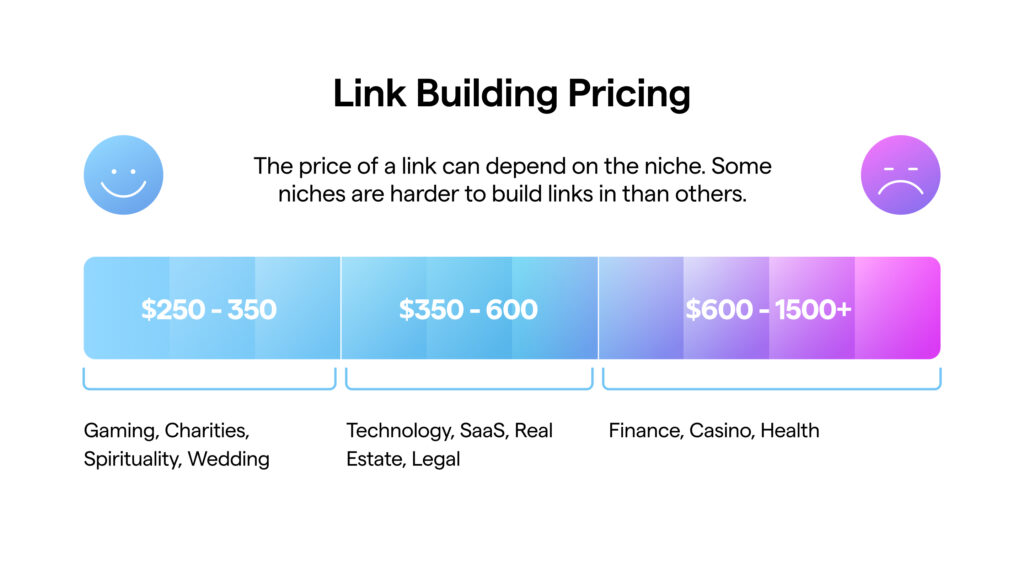
Hubspot found that 46% of marketers spend over $10,000 per month on link building. Another 22% spend $2,500 or less to build links.
A few things that go into the cost of backlink building:
Content Creation
Quality content that is relevant to a website’s industry is essential for successful link building. Content creators must have excellent writing skills and extensive knowledge of content marketing and search engine optimization (SEO) best practices to create content that will be effective for link building campaigns.
Outreach Employees
Whether you hire an agency or build backlinks on your own, you will need at least one person to manage the process. This includes keeping track of link building efforts, researching potential sites for link placements, and writing emails or other forms of communication to request links.
Technology & Tools
To effectively build links, you’ll need access to a number of tools and technology, including a keyword research tool, website analysis tools, and a crawler or link checker tool.
Publication Placements
New York Times, Huffington Post, and other high-authority publications charge premiums for article placements, brand mentions, and other forms of link building.
Quality Control
All links that you acquire should be evaluated to ensure they meet the standards set by search engines and follow best practices for SEO. You need to ensure you’re putting good content on authoritative sites whenever you create a guest post. This process can be time-consuming and, therefore, costly.
Types of Backlinks
Backlink prices also vary somewhat depending on the type of link. The price of an individual link ranges from free to thousands of dollars. Let’s look at each type from the lowest average cost to the highest.
HARO Links
Help a Reporter Out, or HARO SEO, connects journalists to sources to include in their articles. You sign up as a source then receive daily alerts with news topics and requests submitted by journalists looking for reputable sources to quote. These backlinks are free, and can be very high-value links. HARO says there are 75,000+ journalists and writers using the site, so there are plenty working on high DR websites.
Everything does come with a cost, however, and HARO costs your time. You have to sift through the daily emails to find queries relevant to your industry and niche. You also have to pitch your expertise personally for each appropriate request. Speed is a huge factor when it comes to HARO link building as well because there is a lot of competition to be quoted.
Fiverr Links
We hope that you aren’t under the illusion that buying links en masse on Fiverr is a good idea. We even wrote a blog about it. These links are definitely inexpensive, frequently priced as low as $5. But if that sounds too good to be true, you’re not wrong.
SEO Agency Links
These are the types of links Linkflow builds. Agency links range from a couple hundred dollars per link to link building packages $2,000-$10,000 per month. Link building agencies spend a lot of time building relationships with other websites that are ideal for contextually relevant backlinks.
At Linkflow, the sites are analyzed for overall domain authority, traffic, and relevancy to ensure they’re valuable sites for our customers. We also look at page-level signals such as topical relevance and keywords indexed when choosing pages for backlink placements.

PR Agency Links
PR Agency links are the most expensive, because they typically require a PR agency to be on retainer, with link building making up just a piece of the PR services. While there are agencies in the $2,000-$5,000 range, some PR retainers are as much as $50,000 per month. Basically, if PR is important to your business’s niche, it of course makes sense on paper to request backlinks from your agency.
However, PR links are frequently nofollow and are designed more for getting eyeballs on the linking site rather than increasing your SEO authority. You may receive some referral traffic from links built by PR agencies, but your organic traffic is unlikely to improve drastically. This is the opposite result of SEO agency links, which are designed to improve organic traffic and unlikely to garner a spike in referral traffic. We always recommend choosing organic traffic rather than referral traffic. This is because the results from SEO backlinks tend to be long-lasting whereas referral traffic will spike then drop off when the PR is no longer relevant.
Is Link Building Really Worth The Price?
Overall, the ROI you can expect from link building largely depends on where you get your links from, who you hire to manage your campaign, and how targeted and relevant your links are. A well-executed link building campaign can generate plenty of leads and boost organic search rankings, so it can be worth the cost for many businesses.
But there is one caveat: Link building requires time, patience, and resources to do it correctly. Companies that try to take shortcuts with link building risk being penalized by search engines, so it’s important to approach link building strategically and with a long-term vision in mind.
While SEO may not be the primary source of lead conversion for all businesses (it could be PPC, social media, etc.), it certainly has the potential to be very profitable. Being on the first page of a search engine for keywords that buyers are searching for when they are ready to make a purchasing decision can generate a lot of revenue.
What Factors Impact Cost Per Link?
The price per link for your campaign will vary wildly depending on several factors.
- Placement Site: Sites like AP News, Forbes, TechCrunch, and Entrepreneur.com are going to cost a lot of money. By contrast, niche placement sites like industry blogs and forums usually have lower per-link pricing. But this also depends on several factors (more on that later).
- Quality of Links: High-quality links from reputable sites can take time and effort to acquire, resulting in higher costs. Low-quality links from spammy websites will be less expensive but could result in a penalty or ban if Google detects them.
- Type of Link Building Techniques: Included in the cost of link building are the actual link building techniques you use. Some services that are offered are directory submissions, guest blogging, and content creation and outreach. Each of these techniques requires different skill levels, time, and manual effort—all of which will affect the cost.
- Volume of Links: The number of links you need will also affect the cost. Building hundreds of links can be expensive, but it can also bring a huge return on your investment if done correctly.
- Industry and Competition Level: A link building package will sometimes cost more in competitive markets since more effort is needed to compete with established players. High-competition keywords will also require more links to achieve rankings.
- Where Your Links Come From: If you buy cheap links on Fiverr, you’ll end up paying a few dollars per link. But that doesn’t mean they’ll actually be good for SEO. Working with an agency that uses white hat link building techniques and creates good content will cost much more but will result in better-quality links from reputable sources.
- Whether You Outsource: If you hire a freelancer or agency for link building services, they’ll take a cut. But doing it on your own comes with its own costs as well. These include the cost of your time, developing your outreach strategy, and any tools you might need.
The bottom line is that no matter how you go about building links to your website, every link will cost you at least some money. And the investment required depends largely on your competition, the goals you have in mind, and the quality and quantity of links you need.
What Types of Backlinks Are Valuable?

As we touched on earlier, not all links are created equal. Valuable backlinks come from reputable sites with high domain authority and page authority. These are links that search engines trust, and they often require manual outreach efforts to acquire.
Examples of valuable backlinks include:
- Editorial posts from big-ticket publishers like Reuters, The New York Times, and The Wall Street Journal
- Links from industry-specific blogs and publications with high Domain Ratings
- Guest blog posts on websites with high domain authority
- Resource page links from relevant websites
- Relevant links from .edu, .gov, and other non-commercial sites
The cost of acquiring these links will depend largely on the quality of the link and how much effort is required to get it. But each one will require research and high-level strategy.
How Many Backlinks Does My Website Need for SEO?
There’s no black-and-white answer to the question of how many links your site needs for SEO success. The number of links your website needs will depend on how competitive the market is and what type of keywords you’re targeting. Generally speaking, the more competitive a keyword is, the more backlinks you’ll need to rank for it.
Here’s a step-by-step process you can follow to figure out how many backlinks your site needs.
1. Look at your competitors.
To determine how many links your site needs, the first thing you’ll need to do is take a look at your competitors.
How many links do they have? Are their backlinks from high-authority sites? If so, you’ll need to acquire more links than them to compete.
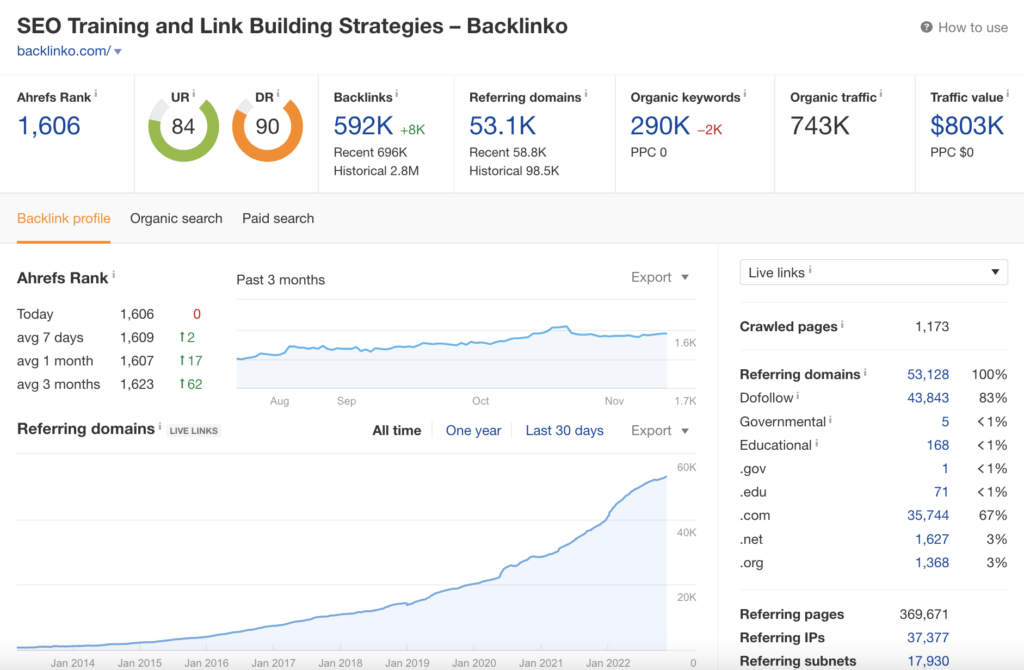
Using the Ahrefs Site Explorer, we can see that Backlinko has around 592,000 backlinks from about 51,300 referring domains. This tells us that it would take a lot of effort to outrank them in the search engine results pages (SERPs).
2. Analyze the quality of your competitors’ links.
It’s not enough to just look at the total number of links. You’ll also need to analyze the quality of the links in order to estimate how many you need for SEO success.
Are their links coming from reputable websites? Do they have a lot of low-quality spammy links?
For example, a page might have 100 referring domains but 50 of them could come from low quality scraper websites.
Knowing this information can help you determine how many and what type of links your site needs.
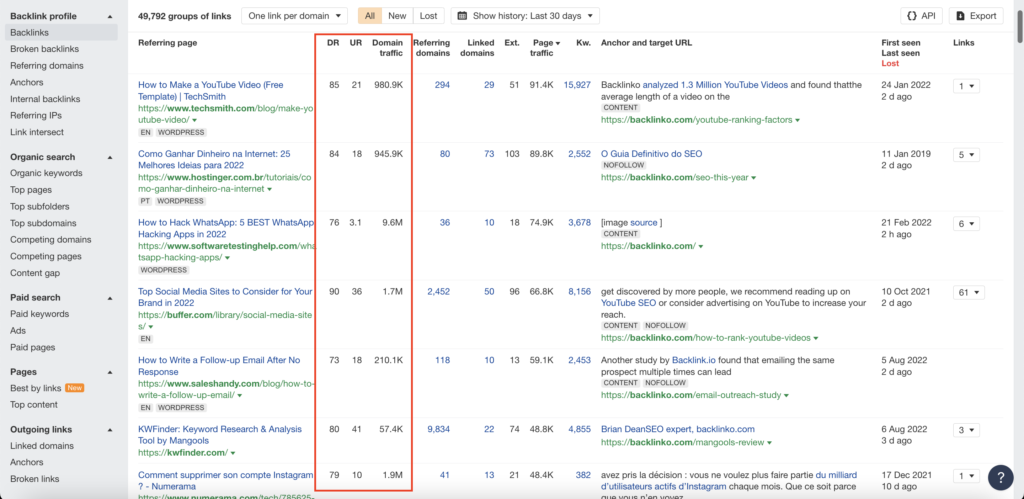
To do this, you can look at each competitor’s link profile on Ahrefs or another SEO tool.
Looking at Backlinko’s backlink profile, we can see that many of these links come from high-DR sites with lots of organic traffic.
3. Build a list of keywords.
Once you’ve assessed your competitors’ link profiles, it’s time to make a list of keywords that you want to target.
Pick pages that are going to drive the biggest ROI or have the potential to drive natural links into your website.
4. Set realistic link-building goals.
Once you know how many links your competitors have and what types of links they’re using, it’s time to set realistic, achievable link-building goals for yourself.

Backlinko’s site ranks page one for “SERPs,” for example.
According to Ahrefs, you’d need about 524 backlinks to your page to compete. Also, Ahrefs Keyword Difficulty doesn’t account for domain authority. If you built 524 backlinks to your page but your domain rating was much lower than Backlinko’s, you’d likely need even more links to outrank them.
Start small and focus on creating quality links from reputable sources. As you build up your backlink profile, you can increase your goals accordingly.
What are the don’ts in link building
When engaging in link building activities, it’s important to be aware of certain practices that should be avoided to ensure a successful and ethical approach. Here are some things to avoid when link building:
- Low-Quality or Irrelevant Websites: Building links from low-quality or irrelevant websites can do more harm than good. Avoid link placements on websites with low domain authority, spammy content, or unrelated topics. Focus on acquiring links from authoritative and relevant websites within your industry.
- Link Farms and Private Blog Networks (PBNs): Link farms and PBNs are networks of websites created for the sole purpose of generating links. These networks often have low-quality content and exist solely to manipulate search engine rankings. Links from these sources are highly discouraged and can lead to severe penalties.
- Exact Match Anchor Text Overuse: Over-optimizing anchor text by excessively using exact match keywords in your link anchor text can raise red flags to search engines. Aim for a natural and diverse mix of anchor texts that include branded terms, variations, and relevant phrases.
- Automated or Mass Link Building: Using automated software or services to generate large volumes of links quickly is not recommended. Such practices can lead to low-quality and spammy links that can harm your website’s rankings. Instead, focus on manual outreach and building genuine relationships with other webmasters.
It’s crucial to prioritize quality over quantity and focus on building a natural link profile that aligns with search engine guidelines. By avoiding these practices, you can create a sustainable and effective link building strategy.
How much do people charge for backlinks?
Hiring a link building agency sounds expensive, but trust us—it’s much more expensive to hire in-house. And while you can use freelancers for a lower cost, agencies are more reliable and have more experience in SEO link building.
When you hire an agency, you can reasonably expect to pay somewhere in the wheelhouse of $3,000 to $10,000 per month for a fully-managed campaign.
But to hire an in-house team, you’ll need to hire writers and editors and either a public relations manager or an SEO manager (who specializes in link building and blogger outreach).
For the sake of simplicity, let’s examine the average cost of hiring these people in-house.
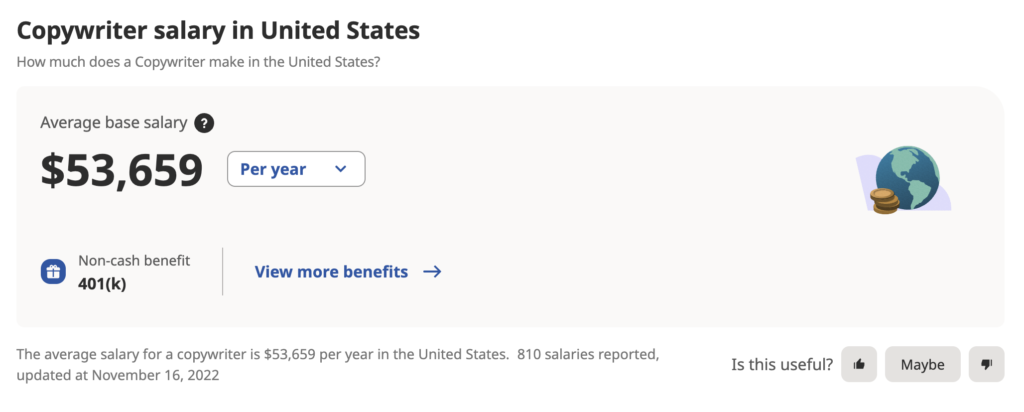
According to Indeed, the average base salary for a copywriter in the US is $53,659.
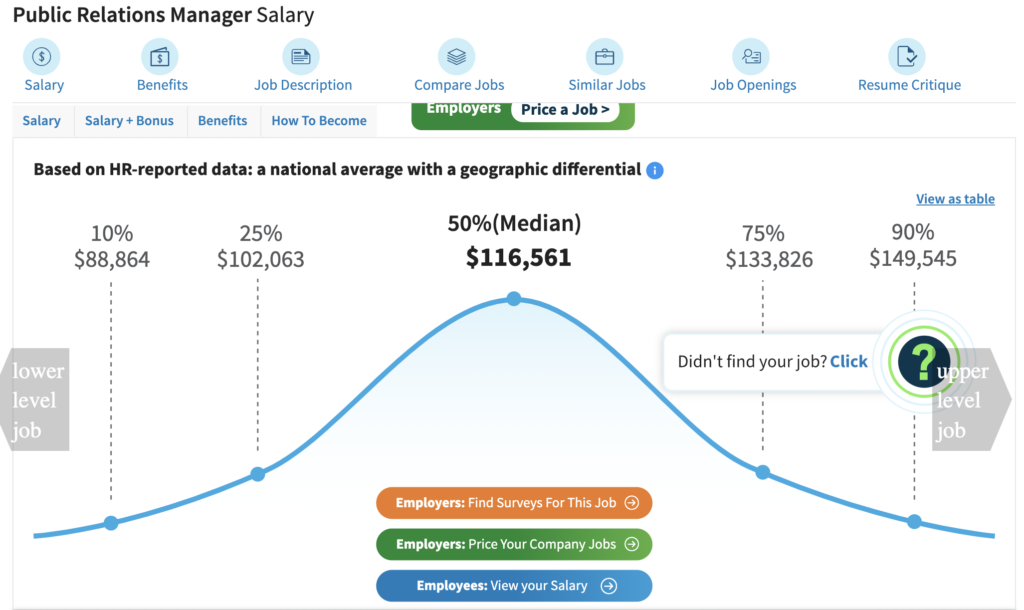
Salary.com data shows that the median PR manager makes $116,561 annually.
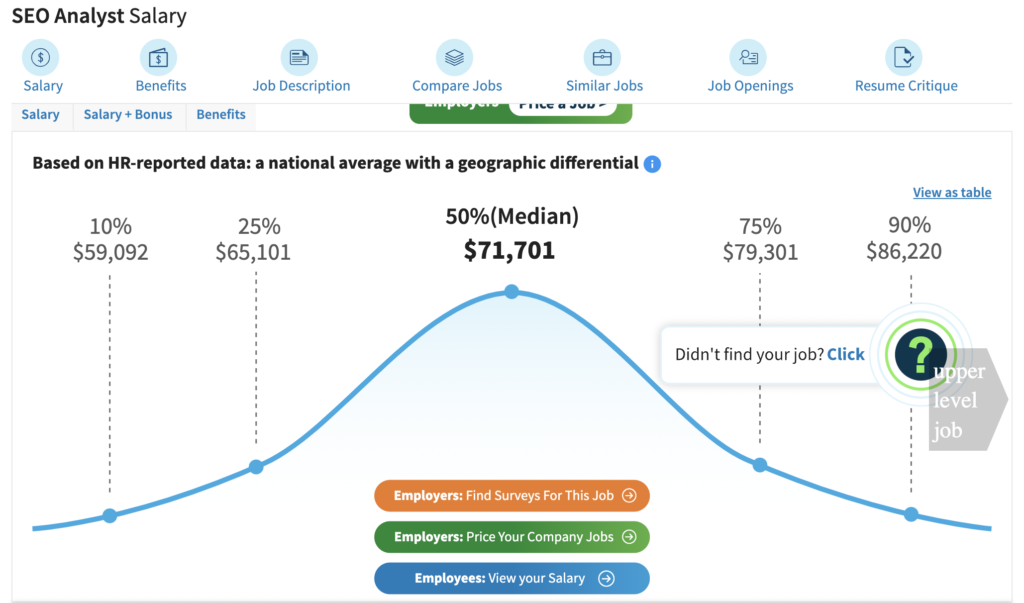
And based on HR reporting data, an SEO analyst makes around $71,701 per year.
That brings your expected total cost to somewhere between $125,000 and $175,000 per year for a basic-level SEO team, without even considering the costs of actually building your links.
In addition to the base salary of these employees, you’re also paying them benefits, and you’ll also need to provide them with the software (e.g., keyword research tools, email outreach software) and training resources (e.g., course material and onboarding documents) they need to succeed.
There’s also no guarantee that they will.
The price of an outsourced link building campaign doesn’t seem too bad now, does it?
Because of the high costs of in-house link building teams, many businesses choose to outsource the task.
Link building isn’t something you should hire internally for unless you have a large budget, an in-depth understanding of Cold Email Outreach, complex needs that require a team of experts, and an existing SEO infrastructure to support the new hires.
Otherwise, link building vendors are your best bet.
The relationship between content and link building
Content and link building strategies are closely interconnected and mutually supportive in an effective SEO campaign.
- Quality Content Attracts Links: High-quality, valuable, and engaging content naturally attracts links from other websites. When you create content that is informative, unique, and relevant to your target audience, it increases the chances of other sites linking to it as a valuable resource.
- Link Building Amplifies Content Reach: Link building efforts can help amplify the reach of your content. By acquiring backlinks from reputable and relevant websites, your content gains visibility to a wider audience. Each link acts as a referral, directing visitors from other sites to your content, which can result in increased traffic, exposure, and potential conversions.
- Links Enhance Content Authority: Search engines consider backlinks as endorsements of your content’s credibility and authority. When authoritative websites link to your content, it signals to search engines that your content is trustworthy and valuable. This can positively impact your content’s rankings in search results, leading to increased visibility and organic traffic.
- Link-Worthy Content Promotes Link Building Opportunities: Creating exceptional content that stands out in your niche increases the likelihood of attracting natural links. When your content provides unique insights, original research, or solves specific problems, other websites are more inclined to reference or link to it. This can organically generate valuable backlinks, enhancing your link building efforts.
A strong content strategy creates link-worthy content, and a well-executed link building strategy helps promote and amplify the reach of that content. At Linkflow, we integrate both content and link building so you can establish a robust online presence, increase visibility, and drive organic traffic to your website.
Build Links Now With Linkflow
We take a customized approach to link building. By getting to know you and your business, creating an SEO roadmap, and setting realistic goals, we can help you maximize your link-building return on investment.
And because we have a large network of bloggers and site owners, we can quickly find link opportunities and get links for a fraction of the cost of in-house link building.
Ready to get started? Contact us today and let’s start planning your link building strategy.

Nick Dyer, SEO Analyst
Nick started his SEO journey in 2017. Currently, he resides in Austin, TX. When it comes to his SEO experience, he’s worked with million dollar brands and builds his own affiliate websites in his spare time. One of his greatest passions is travel and trying new foods. He’s been to Italy, Spain, Australia, Greece and more.
